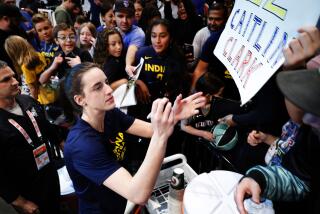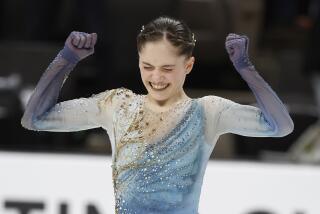Bobek’s Case Was Judged by a New Set of Rules
- Share via
SAN JOSE — When 25 members of the U.S. Figure Skating Assn.’s international committee met after the women’s championship Saturday night at the San Jose Arena, the discussion was about whether 1995 national champion and world bronze-medalist Nicole Bobek should be granted an injury waiver into this year’s world championships. But that was not the issue.
If it had been, based on recent precedents involving national champions, the decision would have been a slam dunk for Bobek.
But when the vote went against Bobek, it was apparent that the USFSA, mandated by an act of Congress to govern the sport in the United States, was signaling not only skaters but also managers, agents and promoters that the association intends to do just that.
“That certainly seems to be the message they were trying to send,” three-time U.S. men’s champion Todd Eldredge said.
The decision’s ramifications could extend far beyond the world championships in March at Edmonton, Canada, ultimately determining who controls the sport or whether it even continues to be considered a sport. At the very least, it is an attempt to rein in skaters tempted at the expense of national and international competitions to grab the hundreds of thousands of dollars available in exhibitions, tours and made-for-television competitions since the Tonya and Nancy spectacle.
The USFSA has been understanding of the skaters’ desire to cash in, even creating competitions for them that offer prize money, but the feeling among association members was that Bobek went too far.
Instead of remaining home to rehabilitate her injured right ankle so that she would be in position to defend her national championship, she accepted a reported $90,000 as a headliner in a 16-city, 20-show Nutcracker on Ice tour in December.
When she arrived here last week, the ankle was still inflamed, and although she gave an inspired effort in finishing third in Friday night’s short program, she was unable to skate her freestyle program a night later.
James Disbrow, chairman of the international committee, said Bobek’s decision to perform on the tour was not discussed in the one hour and 20-minute meeting. But, sources said, it was discussed whether Bobek could be trusted to rest her ankle between now and the world championships while being offered lucrative contracts. Apparently, the committee felt not.
But while Bobek suffered the consequences, the USFSA’s concerns go deeper than her. Several coaches here complained that the quality of skating in the national championships suffered because so many elite competitors spent so little time preparing while involved in more lucrative pursuits.
Defending dance champions Renee Roca and Gorsha Sur said they began working on their new freestyle program only five weeks before the nationals because they were consumed in choreographing a television special. Roca and Sur lost their title here.
So did Eldredge, who, like Bobek, toured with the Nutcracker. He acknowledged after finishing second Saturday that he did not focus on the competition like he did a year ago.
More to Read
Go beyond the scoreboard
Get the latest on L.A.'s teams in the daily Sports Report newsletter.
You may occasionally receive promotional content from the Los Angeles Times.






